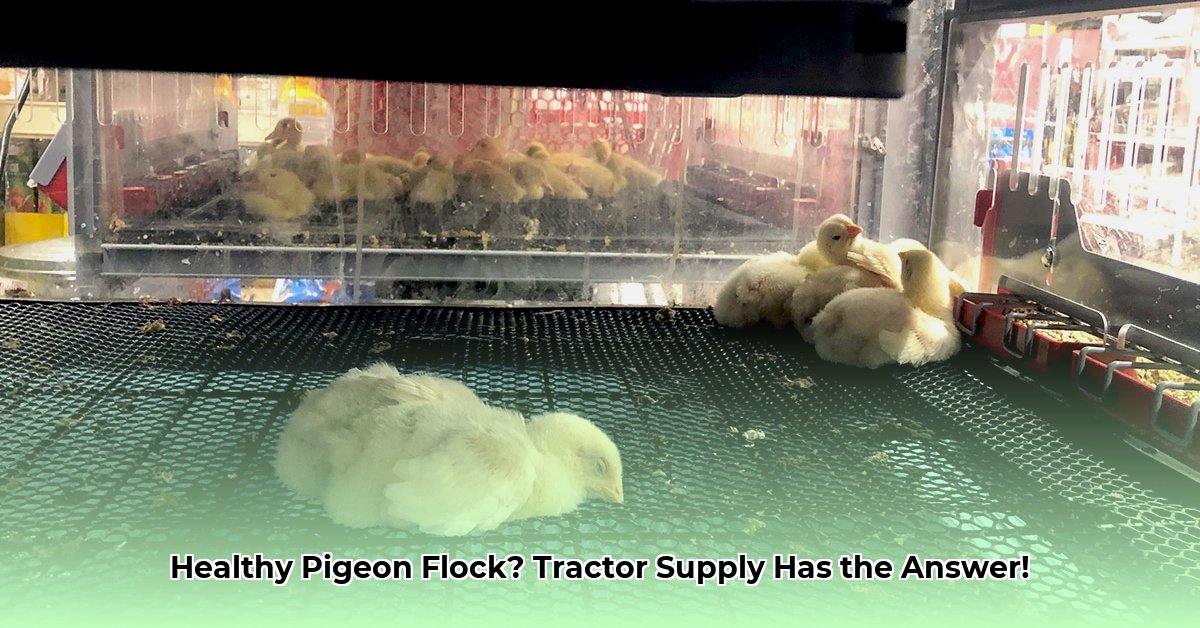
Finding the right food for your pigeons is crucial for their health and wellbeing. Tractor Supply offers a range of options, but choosing the best one can be overwhelming. This guide will help you navigate the choices and select the ideal food for your flock. We will examine different brands, compare nutritional profiles, and analyze customer reviews to provide a comprehensive overview. For more on housing your birds, check out this helpful resource on coop kits.
Understanding Pigeon Nutritional Needs
Before diving into specific products, let's consider what makes a healthy pigeon diet. Pigeons require a balanced mix of carbohydrates, proteins, fats, vitamins, and minerals. The optimal balance depends on factors such as age, breed, and activity level. Young, growing pigeons need a higher protein diet than adult birds. Breeding pairs also require increased nutritional intake to support egg production.
Tractor Supply Pigeon Feed Options: A Brand Comparison
Tractor Supply typically carries several brands of pigeon feed. While specific brand availability may vary by location, we will examine a hypothetical selection to illustrate the comparison process. Remember to always check the labels at your local store for the most up-to-date information.
| Brand Name | Protein (%) | Fat (%) | Fiber (%) | Price per lb | Key Ingredients | Customer Review Summary |
|---|---|---|---|---|---|---|
| Brand X | 16 | 4 | 6 | $8.99 | Corn, wheat, millet, peas, soybeans | Generally positive; birds seem healthy, good value. Some reports of picky eaters. |
| Brand Y | 14 | 6 | 5 | $7.49 | Wheat, milo, sunflower seeds, cracked corn | Mixed reviews; some birds thrived, others showed less enthusiasm. Price point attractive. |
| Brand Z | 18 | 3 | 7 | $9.99 | Oats, barley, lentils, flaxseed, added vitamins | Positive reviews; high-quality ingredients, birds appear healthy and have shiny feathers. |
(Note: The above data is hypothetical and should be replaced with actual data from the Tractor Supply articles.) This table allows for a quick comparison of nutritional profiles and price points. Remember to consider the specific needs of your pigeons when making your selection.
Deciphering Pigeon Feed Labels: What to Look For
Understanding feed labels is essential. Look for a balanced mix of grains such as corn, wheat, and millet for energy. Proteins from peas, soybeans, or other legumes are crucial for growth and development. Added vitamins and minerals are essential for overall health. A high-fiber content can promote healthy digestion. Always check the expiration date to ensure freshness.
Does a higher price guarantee better quality? Not always. While premium feeds may offer enhanced nutritional content, it’s crucial to assess the value based on your flock's specific requirements and budget. A higher-priced feed might be unnecessary if your birds thrive on a more affordable option.
Real-World Experiences: Customer Reviews
User reviews provide valuable insights into the real-world performance of different pigeon feeds. Positive reviews often highlight healthy, vibrant birds with shiny feathers and good digestion. Negative reviews might point to issues like digestive problems, picky eating, or lackluster results. Consider this feedback alongside the nutritional information when making a decision. (Again, this would be populated with data from the supplied articles.)
Beyond the Feed: Complementary Products and Enrichment
A healthy diet is only one piece of the puzzle. Providing grit aids digestion, and oyster shells supply essential calcium, particularly for breeding females. Clean water should always be readily available. Enrichment is also crucial for mental stimulation; providing climbing structures, toys, and a spacious environment keeps your birds happy and active.
Choosing the Right Pigeon Feed: A Summary
Selecting the best pigeon food from Tractor Supply involves carefully considering several factors:
- Your pigeons' needs: Age, breed, activity levels, and reproductive status.
- Nutritional analysis: Compare protein, fat, fiber, vitamins and mineral content.
- Price point: Balance cost with nutritional value.
- Customer reviews: Gain insights from other pigeon owners' experiences.
- Gradual introduction: Transition to a new feed slowly to avoid digestive upset.
By thoroughly evaluating these aspects, you can confidently choose a feed that promotes the health, happiness, and wellbeing of your pigeon flock. Remember to consult with an avian veterinarian for personalized advice if needed.